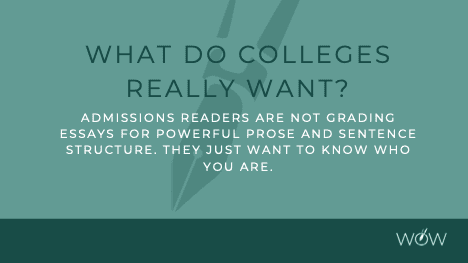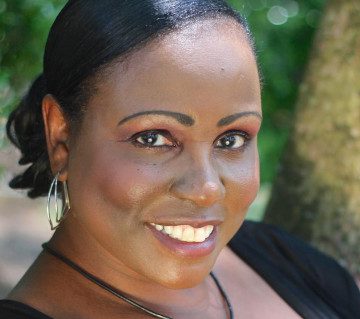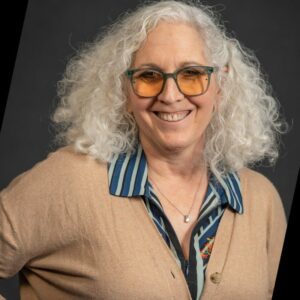Table of Contents:
- What do colleges want in a personal statement?
- How can I be unique in a college essay?
- Where can I get the best advice?
- What is a college essay?

There’s so much information about college essays out there, we sometimes wonder how anyone, even a bright, talented student, can tell the difference between what’s worth listening to and what’s not.
That’s where I can help. I’m a journalist by training, and I only share information I have checked and double-checked, then checked again.
I go straight to the source – college admissions officers – to find out what they’re looking for in application essays, and I’m excited to share what I know with you.
Students and parents ask us questions all the time.
We’ve compiled the most common ones here for you.
How will the Supreme Court’s Affirmative Action ruling affect college essays?
There are always distractions in this world of high-stakes college admissions (like the US Supreme Court ruling against affirmative action and ChatGPT). While these are real issues that affect so many people, the way we approach the college essay never changes.
In our perfect world, we’d like Moms and Dads to lower the stakes for students, mute the distractions, and focus more on what matters most: the mental health of the students applying to college.
There are ways to reduce stress and help high school students gain much-needed confidence as they apply to college. We’re proud of our approach. Yes, there will be new prompts, but we know how to parse them, so students can answer them effectively.
Our belief is that no matter what’s going on around us, the process for writing college essays remains the same. Our tried-and true approach – which we’ve used since starting Wow in 2009 – works every time and with any type of student. We use it to work with students and to train professionals who work with students on college essays.
We don’t have a crystal ball. We can’t predict the future. But we are confident saying no matter what comes our way, whether it be how to answer a diversity prompt, or how to write about sensitive topics, we’ll be able to help your child answer using the Wow Method. It works!
What is a college essay, really?
The term college essay refers to any piece of writing that a college requires as part of the admissions process. Because most schools do not conduct interviews, essays are often the only opportunity to share your unique voice. You may hear several different terms used to describe this type of writing: personal statements, personal insight questions, supplemental essays, or short answers. We include all of them under the umbrella term, college essay.
For (much, much) more information about the college essay, download a free copy of our book, How to Write an Effective College Application Essay: The Inside Scoop for Students.
Will ChatGPT be the end of the college essay?
As we already said, the application landscape is filled with a lot of information about college essays. Some of it is helpful, but so much of it is either out of context or simply inaccurate. But the things we’ve heard about this new bot from so many pros simply don’t align with what we’ve heard from the people inside admissions.
To be blunt, they have bigger fish to fry than this. The college essay is not going away anytime soon. And you might even see more of them.
Our suggestion: Mute the outside noise. Instead, focus on this: The college essay is a thinking task, one that requires reflection to be effective. A bot cannot deliver that!
A bot cannot think.
A bot cannot reflect.
A bot cannot synthesize information that is stored inside a student’s mind.
My business partner, Susan Knoppow, talked more about this bot during a recent roundtable discussion of professionals who work with students applying to college. Your parents should consider watching the replay here. She offered concrete, process-based tips to help students stay on track and not get distracted by all the noise surrounding ChatGPT and all the rest. This will help you understand our approach to the essay. We are not worried about Open AI.
We’re curious about AI too. It’s fascinating. But it doesn’t have to change the way we all approach college essay coaching.
What do colleges want in a personal statement?
Admissions officers are looking for the same thing they’ve always looked for: reflection and insight. Colleges want you to reflect to the best of your ability in your answer to any prompt so they can get to know you a little better as they review your application. They want to be able to learn something about you that they might not otherwise know about you from the rest of the application package.
To succeed and write an effective essay, which is the real goal, you’ll have to keep your story genuine, focusing on traits and characteristics that matter to you. Only you. Not to your high school counselor. Mom or Dad. Older sibling. English teacher.
Consider these questions: Why are you telling colleges your story? What do you want them to know when they are done reading it? What does that demonstrate about you?
How can I be unique in my college essay?
Despite what you might have heard about writing college essays that are unique, college admissions decision makers are not looking for something unique when they read student essays.
“I’ve been working in college admissions for a few decades. In this time, I’ve noticed that students spend too much time searching for stories they believe will make them sound different or unique.,” said Shawn Felton, the Executive Director of Undergraduate Admissions and Deputy Chief Admissions and Enrollment Officer at Cornell University. “Please don’t do that. It’s a waste of your time. I don’t want different. I don’t want unique. I just want to know what makes you the person you are. I want to know what matters to you. I want to know what you care about. I want to know what you dream about.”
Felton does not read each essay with something specific in mind. He just wants to get to know you beyond what he sees in the rest of the application package.
“There is a preoccupation with being different and unique among college applicants. I get it. The stakes are high, and there are so many applicants to so many schools these days. But the reality is, most college applicants are much more alike than they are different. The search for something unique to share is a long, windy road going nowhere quickly. Instead, worry less about being unique and just be you and show admissions readers who you are.”
Do colleges really read the essays?
They wouldn’t ask you to write something they didn’t plan to read.
How do we know? We have asked several dozen admissions officers this very question. The collective answer was yes.
“We read each writing opportunity,” according to Erica Sanders, the Director of Undergraduate Admissions at the University of Michigan, Ann Arbor. “We want to put it in context with what we see academically. We want it to be specific, different, something we can’t find elsewhere on your application. We don’t have the ability to interview students. We want to hear their voice. As I am reading at 11, 12 or even 1 a.m., I want to read something that stands out, something that says, ‘Wow, this is a student I want to meet.’ “
Related Articles:
Kim Discusses Wow’s “Secret” College Essay Writing Tips
How to Answer the University of Michigan Prompts
What’s The Biggest Mistake Students Make in their College Essays?
Where can I go to get the best advice on college essay?
Stick with us; we get our information direct from the source — admissions officers. There’s a lot of inaccurate information out there about the college essay. Just about anyone can post a blog, speak at a student event, or record a video that’s full of bad college essay advice. For this reason, we always go straight to the source. All our advice comes directly from the source: College admissions officers themselves who read thousands of essays each year and know what they’re looking for.
“Focus on a moment you feel has defined you as a person, and as a student,” said Tamara Siler, Deputy Director Admission, Access and Inclusion at Rice University.
“Students think they need a monumental experience, but the essay can be about something small. What does it mean to you? That is what we want to know,” said Calvin Wise, Director of Recruitment at Johns Hopkins University.
All our advice, in this blog, our book, and on our website, comes from conversations with these and other officers as well as our 14+ years in the college essay industry. You can’t trust everything you read online, but you can trust us.
How important is the college essay?
Very important, but no one college essay stands on its own. It’s one piece of a holistic review. Academic rigor (grades, difficulty of courses) is, and always has been, the most important aspect of the application. For many schools, standardized test scores come in second place. While an amazing essay can support your case for admission if you are qualified for the school you are applying to, it will not rescue a lousy transcript or help a student who is not qualified get an offer of admission.
However, a college essay can absolutely tip the scale (in either direction!) for a student whose transcript places them as a borderline candidate for admission to a school. The essay is a vital opportunity to make yourself seen and heard inside the admissions office, so you should put effort into every essay you write for every college on your list. It’s always worth it to write the best essays you are capable of.
What are the best college essay topics?
There is no such thing as a best college essay topic. That’s a myth. Any topic can be effective, which is the goal, as long as it allows you to answer the prompt with a focused, genuine, and reflective story that showcases a positive trait(s) that is meaningful to you.
Often, when students come to this task with a topic in mind, they haven’t thought about what telling this story will add to their application. Rather than focusing on best topics, we ask our students to consider this: What do colleges already know? What do you want them to know? Why does this story matter?
To pick an effective topic, we start by talking with students like you to determine what characteristic you want to highlight with their essay. Then, we brainstorm story ideas that show that characteristic.
What are the worst college essay topics?
Just like there’s no such thing as the best college essay topics, there’s no such thing as the worst college essay topics, either. Any topic that allows you to answer the prompt with a focused, reflective, and genuine story that highlights a positive trait that colleges can’t glean from the rest of your application can be effective.
The worst college essay topics are those that do not allow you to meet those criteria. Is your topic really about someone else other than you? Does your topic feature something negative? Does your topic focus on someone else, and not you? If so, your topic may not make an effective college essay.
Can I write about sports or depression in my college essay?
You can write about anything, including sports, as long as you answer the prompt with a story that showcases a positive trait that’s important to you, and does so in a meaningful story that is both reflective and genuine.
We hear the same myths you do: Sports/mission trips/summer camp/depression/anxiety/injury/death are taboo topics. This is confusing and really bad advice. Yes, you need to be careful, making sure you write your college essay about you, and not about your chosen topic.
Keep in mind, if done well, no topic is too personal or off limits. However, always remember: Don’t report, reflect. For sensitive topics (depression, death, anxiety, ADHD, gender, resilience, problem-solving skills, anything), if the issue itself is the focus of the essay, you’re reporting. The college essay is not the place to report what’s going on, or to process your feelings. It’s a place to reflect on something you’ve already experienced and processed a bit. If resilience, problem-solving skills, compassion, or any other trait is the focus, you’re reflecting. And that’s what colleges want!
Will colleges know if someone helps too much with the essay?
Assume the answer is yes. There’s a fine line between getting help and letting someone write part or all of your essay.
While parents and others can’t always tell the difference, admission officers know when someone other than the student writes a story. And they don’t like it.
If a student has an adult write it, the admission committee can tell. They read and recognize patterns, voices. They know what types of grades you get in English. They know when big words don’t fit the style. We can tell, too.
You don’t want to give colleges a reason to dig further after reading your application. According to The Harvard Crimson, if plagiarism is detected, the admission committee at Harvard will contact the student and give them an opportunity to explain—some instances are unintentional, after all. But “if the student’s response does not suffice, the application is rejected.” (Some colleges won’t give you the chance to explain at all, and you might not ever know why you were rejected!)
Bottom line: you are the only person who should be writing your college application essay.
How long should my college essay be?
That depends. The Common App personal statement, for example, must be between 250-650 words. It cannot be more than 650 words and it cannot be less than 250 words. The instructions are clearly spelled out on the Common Application. Some short prompts range between 50 and 150 words. Read the instructions for every application, every supplement. Make sure to read the prompt carefully and stay within the designated word count.
What are the biggest mistakes students make in college essays?
The single biggest mistake students make (according to admissions officers themselves) is not answering the prompt. You don’t want to make that mistake, so take some time to read each essay question closely and make sure you understand it before you start writing.
You’re not alone if you thought an essay’s topic was the first thing to consider. That’s what students talk about on websites where just about anyone can share an opinion without much expert moderation. It’s not your fault if you did not know this! But let’s be clear: It’s hard to answer a question if you don’t understand what it’s asking.
Another mistake students make is letting a parent or teacher write or edit their essay. For one, admissions officers can easily tell when something was not written by a student, even if the changes made seem relatively small to you. This should be your story, in your words, written by only you.
How can I get started?
Many students start their colleges essays in the wrong place: the topic! Students tend to get excited over college essay ideas they think will get them some attention inside the admissions office, without giving much consideration to what the college essay prompt is really asking.
But all college essays begin with a prompt, not a topic.
The first thing we do with our students is help them understand the prompt! (That’s Step 1 of our Wow Method).
If you want your college essay to shine, then take a few steps back, put the idea aside, and make sure you know what you want to share with colleges before you even begin brainstorming for ideas.
To answer any prompt correctly, ask yourself this question: What do I want the readers of my application to know about me apart from courses, grades, and test scores?
Your answer is key to your success on the essay. Think about the traits and characteristics that are important to you, not experiences, activities, and accomplishments.
Before you write that first draft, you need to figure out exactly what you want readers to know about you.
Which structure should I pick for my essay?
None. A college essay’s structure will emerge organically during the process of writing and revision. There are no templates or tricks to shortcut the process or make this task any easier for you.
At Wow, we don’t name structures, and we don’t choose a structure for students to model. That’s not productive. We don’t need to do that because our process empowers students to develop a structure to fit their story, not choose a story (or stories) to fit a structure.
We’ve heard about the multiple scene essay. It’s no better or worse than any other structure. But it’s not the place to start. And that’s not something we think a student should decide up front.
It’s important to focus on content first, then structure, and finally, polish.
What if I am a poor writer?
Every year, we work with students who tell us they cannot write. They don’t believe in themselves, but we know better. We challenge them to follow our approach, and it works, every time. Why? With simple instructions, anyone can learn how to write.
Admissions officers don’t expect (or want!) essays that sound like they were professionally written. In fact, this is a major red flag that could lead to suspicions that someone helped you write your essay, which could lead to an automatic rejection.
Instead, admissions officers want essays written by high school seniors that sound like they were written by high school seniors. Everyone, no matter how much writing experience they have or how skilled they consider themselves, has a writing voice. Embrace yours, and you’ll be golden.
What’s Wow’s secret sauce?
Process. Plan. Schedule.
Many parents expect to find some magic formula that’s going to help their child write the perfect college essay, something outstanding that no one’s ever seen before and will guarantee admission into college. The hard truth is that there is secret formula, despite what you hear or read.
Our Wow process is our magic.
The Wow Method is simple, with clear instructions to help you succeed. Your coach will help you build on your strengths and demonstrate your best qualities.
From brainstorming ideas through multiple drafts and final proofreading, we plan out every task so you can calmly write essays that will enhance your applications.
Most of our students apply to 4 or more schools, which means they have to write 10-15 essays. We use a proven schedule that can be modified to meet your unique needs.
For more information about Wow, go to wowwritingworkshop. If you are interested in working with Wow and have questions, I’d be happy to provide a free 20-minute consult. Set up your consult here.





